Participating just for completion, or racing for time?
Is one a loser for entering a race just to finish? Should one go full-tilt and “do their best” or should they play it safe “just to finish”?
This question plagues me constantly.
Those who are not intimately familiar with Ironman have no idea about what a “good time” would be, and frankly, don’t care about the final time. All they want to know is “Did you finish?”
I have rarely been asked about my finish time for any of my events.
My coach has great confidence in me. Based on all of his science, technology, spreadsheets and experience, he is very confident I can achieve a time that to me, seems wholly unobtainable. But as Napoleon Hill is credited with saying, “Whatever the mind can conceive and believe, it can achieve.”
I do believe that is true, but with this caveat to be added……with proper training, hydration, nutrition, rest, coaching, race discipline to stay within proper HR zones, and baring any unforeseen mechanical issues with the bike, heat-related health issues, hyponatremia issues, dehydration issues, repetitive-motion injuries, and frankly, just freak accidents that can happen at literally ANY point in the race.
Freak Accidents?
Yep. These accidents and unanticipated problems can hit you in literally every part of the race. In the swim, the water can be so cold that your muscles cramp up, in some cases causing extreme pain. One can also get kicked in the head, scratched in the opening turmoil, get their mask pulled off, step on coral or a sharp rock or glass and lacerate their foot before they take even a single stroke!
In the bike, mechanical issues can sideline you quite quickly. Flat tires are to be expected and planned for. But just this past year at the world championships in Kona, the reining champion Chris McCormack was sidelined for the entire race after he broke a shifting cable on his extremely aero triathlon bike. The cable was routed internally, that is, within the frame so as to minimize wind drag. When something like this breaks, one needs special tools, even under the best of conditions. Even the guys from the van with all the tools said that it would take them at least 20 – 30 minutes to fix. At that point, his race was over. But one can also break a chain or have any number of mechanical issues or crashes.
Finally, in the run, one can trip on an elevated gap in a sidewalk. Trust me, after a long day on the bike, one tends to lose a bit of concentration, and one small misjudgment, or turning a gaze to an excited spectator, and one could find themselves face-first in the concrete. Running also brings out all of the real GI problems from the day. These are the worst and you just feel so terrible for these people. At this point in the race, most of us mid-packers are not competing, we are just hanging on to finish. And you really feel terrible when you see someone just coming apart at the seams with vomiting, diarrhea and horrendous gas and stomach cramps. This is a horrible way to end your day, especially if it hits you early in the run and you still have 20+ miles to run/walk/crawl.
All these potential problems swirl through my mind in the week prior to the event.
As an Eagle Scout, I am always prepared…for anything. So my mind races with every conceivable potential problem I might experience and then with possible solutions. It’s tough to rest or sit still.
And all this planning (actually…worrying) has caused a horrible GI problem that has forced me to stick close to home. And this is a terrible cycle, because the more I am at home, the more time I have to sit and think and plan. This only creates more stress and worry, leading to more GI problems.
The worry and jitters are likely caused by an intense desire to finish. To have come this far, gone through so much, all the money, all the training, all the doctor’s visits, all the weekends away from family on 6 – 8 hour workouts, and then to come home with a DNF (Did not finish)? I could not bear that. To me, I would feel ashamed and very embarrassed.
I know logically, that a certain number of participants will always DNF and it will have absolutely nothing to do with their preparedness, fitness or planning. Their DNF will be due to situations totally beyond their control. So no matter how much I plan, there is a chance that I could be one of the DNFs.
My strategy is to finish at all costs. Under all circumstances and regardless of the pain or setbacks. There will be no turning back. There will be no sitting down to rest. I will continue under all hardships until I cross that line or am ejected from the race due to not meeting a time cutoff or due to medical problems.
What this strategy means is that I will be participating at the lowest possible risk. I will “under-perform” by design, keeping my watts, HR and pace below the levels that I normally achieve in training. Not because I am a quitter and don’t want to test myself, but because I will never quit under any circumstances. And by participating at a lever where we minimize the risk of a bonk, a blow-up or other stress related issue, I am substantially reducing the chances of a problem that could possible lead to a DNF.
So the plan is set and I must have the discipline to stick to it. That means, don’t worry when people pass me, and at all times, I must fight the normal temptation to speed up and catch that guy right in front of me.
But even with the plan firmly in place and my coach totally on board to support me and to yell out to me to “slow down and stick to our plan” if he finds that my splits are too fast, I am still nervous.
It’s not until I have created an extremely detailed packing list of everything I will need, and packed everything, checking it 3 – 4 times to double check everything, that I begin to relax.
Knowing that everything is packed, all the gear is labeled and put in separate pouches and categories based on each event, I am finally able to rest.
skip to main |
skip to sidebar

CONTACT: John@IronAmbition.com

Size 48 Brooks Brothers Suit with a 42" waist! When I hit 210 lbs. I stopped weighing myself.

Just a few days after my Full Ironman. 33" waist and 52 pounds lighter
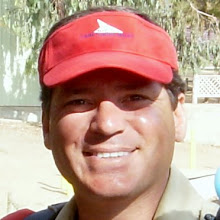
At this point, I had lost almost 15 pounds, just under 200 lbs here.
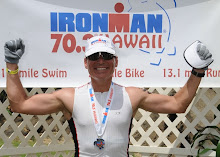
Weight: 165 Waist: 32/33" HR: 43
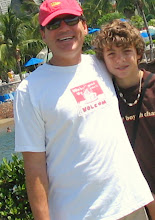
Connor and Dad on our cruise through the Panama Canal
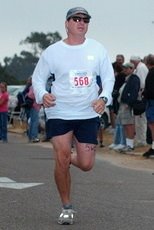
This is the first Tri I entered; I was just dying here! Compare that 41" waist to my Hawaii 70.3 right below.

Running the final leg of the 70.3 Ironman Triathlon

John Callos tipping the scales at 210. My friends never told me how fat I was getting, but I can sure see it here!
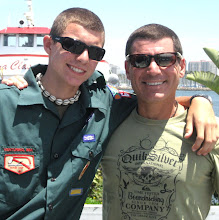

At just barely under 160 pounds, I'd lost 10" off my waist.
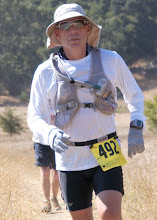
31 Miles in 95-degree heat in the Mountains above Malibu, CA.

This one hurts. I know exactly where this was taken. It was taken at the low-point of my self esteem. I would not even go swimming with my son because I was so embarassed about the huge belly I had developed. I was ashamed. Maybe the long hair was a way to even-out my very fat face!
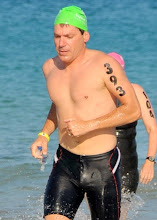
Exiting the 1.2 Mile Swim Portion of the event. Note the scratches on my chest; people were VERY aggressive at the turns!
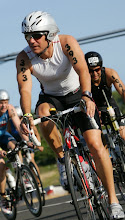
John D. Callos #393

Stopping during the run to talk with my family

Just prior to the swim start
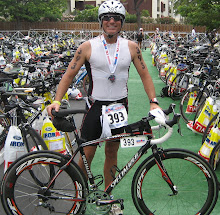
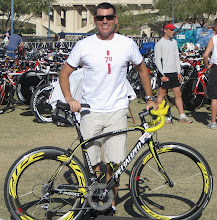
Check-in at the bike barn with my new bike.

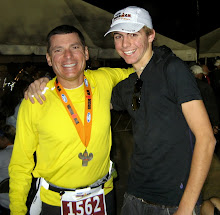
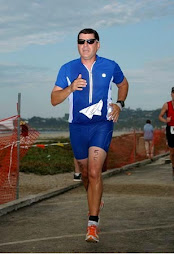
![]()
My journey to complete the Full Ironman Triathlon.

CONTACT: John@IronAmbition.com
THE BEFORE SIDE

Size 48 Brooks Brothers Suit with a 42" waist! When I hit 210 lbs. I stopped weighing myself.
THE AFTER SIDE

Just a few days after my Full Ironman. 33" waist and 52 pounds lighter
About Me
From "Seat 2A" to IRONMAN.
The purpose of assembling my thoughts and tracking my progress is to catalogue my journey from corporate excess and sloth to my seemingly unobtainable goal of completing the full Ironman Triathlon: 2.4 Mile Swim, 112 Mile Bike followed by a 26.2 Mile Marathon run.
Will I achieve this goal?
I certainly believe that I will, but this site is called Iron Ambition because this is my "ambition," not my life.
Will I achieve this goal?
I certainly believe that I will, but this site is called Iron Ambition because this is my "ambition," not my life.
For a complete explanation of "Seat 2A" please see my post from July 10, 2008.
- John D. Callos
Boy Scout Camp Catalina: 2005

At this point, I had lost almost 15 pounds, just under 200 lbs here.
The "AFTER" Side

Weight: 165 Waist: 32/33" HR: 43
BEFORE: Look at that 42" waistline!

Connor and Dad on our cruise through the Panama Canal
Big Man Running

This is the first Tri I entered; I was just dying here! Compare that 41" waist to my Hawaii 70.3 right below.
Kona Ironman 70.3

Running the final leg of the 70.3 Ironman Triathlon
At Peak of Plumpness and Corporate Excess

John Callos tipping the scales at 210. My friends never told me how fat I was getting, but I can sure see it here!
Dad and Connor Summer 2008

Nov 25, 2008

At just barely under 160 pounds, I'd lost 10" off my waist.
BullDog 50K Ultra Marathon - Aug 2008

31 Miles in 95-degree heat in the Mountains above Malibu, CA.
Family Vacation: 2002

This one hurts. I know exactly where this was taken. It was taken at the low-point of my self esteem. I would not even go swimming with my son because I was so embarassed about the huge belly I had developed. I was ashamed. Maybe the long hair was a way to even-out my very fat face!
Kona Ironman 70.3

Exiting the 1.2 Mile Swim Portion of the event. Note the scratches on my chest; people were VERY aggressive at the turns!
Bike Portion of Kona 70.3

John D. Callos #393
Kona Ironman 70.3

Stopping during the run to talk with my family
Dad and Connor: Kona 70.3

Just prior to the swim start
After the Race in the Bike Transition Area

New Bike: Tempe Ironman

Check-in at the bike barn with my new bike.
Dad and Connor post Kona 70.3

Dad and Connor Post Tempe

Top Fitness Goals - Aug 2008
- *Eliminate IT Band Problems (Done. July '09)
- *Full Ironman Triathlon (Done Nov '08)
- *Run: 50 mile Ultramarathon (Done Aug '09)
- *Swim an open water 10K (Done July '09)
- *ULTRAMAN Canada (318 miles) (Done Aug '09)
- *Write Book re: Ironman (Done Mar '09)
- Accepted to ULTRAMAN Hawaii 2010 or 2011
- Bike: Double Century (200 miles)
- Eliminate Trigger Point Issue
- Fifteen Correct Pull Ups
- Ironman World Championships (lottery)
- Keep weight under 159 pounds
- Less than 32" waist at BB
- Run Western States 100
- Run: Badwater 135
- Run: Carp to Solvang (50 m.)
- Run: LB to Carp. (112 mi.)
- Run: SB 9-Trails (35 Miles)
- Swim: Alcatraz to San Francisco
- Swim: Catalina to L.B. (23 miles)
- Swim: Entire Golden Gate Bridge
- Swim: SB Wharf to Carp (10 Miles?)
My Confirmed Race Schedule
CONTACT INFORMATION
email: John@IronAmbition.com
Websites:
VIDEO:
http://www.johncallos.com/johncallos/ironambition.wmv
http://www.johncallos.com/
http://www.ideabridge.com/
Phone: 800+986-1230
My family in the Old Country (Alykes Beach, Zakynthos, Greece). There, the family uses the original "Kalos" surname. We are in contact with the family and we have a wonderful, long history on the Island. Check it out here:
http://www.montes.gr/index.php
Websites:
VIDEO:
http://www.johncallos.com/johncallos/ironambition.wmv
http://www.johncallos.com/
http://www.ideabridge.com/
Phone: 800+986-1230
My family in the Old Country (Alykes Beach, Zakynthos, Greece). There, the family uses the original "Kalos" surname. We are in contact with the family and we have a wonderful, long history on the Island. Check it out here:
http://www.montes.gr/index.php
Fastest Times Log
- 6.2 Mile Open Water Swim 4:17 (2009)
- ULTRAMAN Canada 35:18 (2009)
- 53 Mile Double Marathon - 11:49 (2009)
- Bulldog 50K (31 mile) Ultra Run: 7:29 (2008)
- High School Half Mile: 1:57 (1978)
- Three Mile Cross Country: 15:45 (1980)
- High School 2-Mile: 10:28 (1980)
- High School Mile: 4:52 (1979)
- Vineman 70.3 Half Ironman: 5:51 (2008)
- IMAZ - Tempe Full Ironman: 13:58 (2008)
- 100 Mile Weekend Ride: 6:06 (2008)
- 20 Mile Weekend Run
- 13.1 Mile Half Marathon: 1:59.30 (2008)
- 1,000 meter swim : 16:48 (2008)
- 112 Mile Bike to Carpinteria
- 15 mile run
- 10 mile run
- Mile pace while training: 8:30 - 9:15 per mile
- 50 Meter Swim
- 200 Meter Swim
- Mile Run on Track
- 100 meter swim
Santa Barbara Tri - 2007

NeoPod
NeoCounter
KEY PEOPLE TO THANK
- Scott Gower at Go For It Sports: Scott is a world class endurance athlete and about the nicest guy you'll ever meet. Connor and I met Scott while he was setting up for the Carpinteria Sprint Triathlon one year. We helped him pitch his tent and lay out his tons of gear for sale. I was very interested in this gear and the sport, and Scott...well, he was the fittest man I had ever seen; still is. He encouraged me to try this sport sometime. I NEVER thought I could do this, ever, but he encouraged me and gave me a hat that I still wear today ("Tri") . Scott remains an inspiration and I follow his races closesly, most recently, a top-10 finish in the Hawaii Ultraman World Championhips in 2008! Awesome Scott!
- Tri-Talk Podcast and David Warden: David's Podcast is fantastic. I loved all the research and the science behind each show. While he is currently working on a book and other coaching endeavors, you can still listen to his Podcast at www.Tri-Talk.com
- Steve Runner and Phedippidations Podcast: Steve has produced a fantastic Podcast. He does an incredible amount of research on many of his topics and he's got the guts to have an opinion. He is an average guy like the rest of us and it's easy to relate to his struggles, injuries and setbacks as he pursues his goal to break 4:00 hours in the marathon.
- Bob Babbitt and The Competitor's Podcast: Bob has such a great way about him, and while we have never met, his interviews and Podcast have been a source of extreme learning and inspiration. I would love to meet Bob at some point. This is always a truly outstanding Podcast.
- Surf City Cyclery: Sean, TJ and especially Mike, you guys have been absolutely fantastic!! Getting into the sport initially, I was really taken advantage of by other shops, but you guys reeled-in my spending and set me straight on great quality bikes. Mike was very patient with fitting and took a personal interest in tuning my bikes. The replacement set-up following my bike accident is fantastic. I highly recommend Surf City Cyclery!
- CarboPro and SportQuest: Jeff personally designed a custom race and training protocol for my hydration and nutrition needs. I have now converted to only SportQuest products, including CarboPro1200 and all the supplements. These products work synergistically to minimize the risk of hyponatremia and dehydration, as well as speed the recovery time from tough workouts. I am a huge fan!
- Dr. Jeffery Ho: After over one year of seeking solutions to constant pain in my upper back, you solved the problem with Cortisone injections. We knew we finally hit that knotted trigger point when the muscle had a violent, involuntary spasm that nearly pushed the needle right back out of my back! Seven treatments of "wet needling" finally got this pain under control and allowed me to get my 6 - 7 hour training rides complete on the weekends.
- Eric Weber: As a world-class water polo player, you taught me a few "moves" that may have literally saved my life in the open water swim where 1200 raging lunatics are all grabbing and climbing over one another at the first buoy turn of each swim.
- David Jochim: As a world class Triathlete, you were perhaps one of the most open and coachable IdeaBridge clients; you really understand coaching. But your level of fitness was the greatest inspiration for me. You had completed many Ironman and triahlon events and hearing your stories made me dream of one day completing my own triathlon. Thanks!
- Kelvin Shields: From the moment we met, there was a connection. You helped me organize my life and priorites on what matters most. As a partner in business and as an inspiration doing your own 70.3, I am a much better man for knowing you.
- Kevin Kelsey: The world's greatest business partner and great friend. You have made allowances and clearly taken up the slack when I am out training 15 - 20 hours a week. These Ironman finishes would never have been possible without your support. Thanks Kevin!
- David Warden: Thanks for believing in an over the hill, middle aged, former athlete who hadn't done a thing in 25 years. You were booked up with athletes but took me on as a special experiment. You have kept me injury free and motivated. I love the science and research, but more than anything, it's the accountability to a world expert that forces me out of bed at 4:30am!
- Chris Barsh: Thanks for the enouragement the day prior to my first race (that was huge!) and thanks for helping me in my carbo loading on Saturdays at our "Club"
- Connor: Thanks for getting up at 3:00am in Kona to encourage me when I was up worried about my first 70.3. Your encouragement of, "You've got this Dad!" stayed with me the entire race and every day since!
- My wife: Thanks for the understanding, support and flexibility to do all these workouts, dropping me off 15 miles away so I am forced to run home, and especially for really pushing me out the door when I would have often just skipped the workouts! I really appreciated you getting up at 4:20am to take me to the Tempe venue and was thrilled that you and Connor were right there at the finish line at 9:00pm!!
- Amanda: As my first coach, you did a great job to get me out of seat 2A and kept me injury free with the right balance of fun and adventure that I needed.
- Mark Ganz and SLT: Your offsite presented the real challenge for us all to make big changes to our health. Within one year of our offsite, I completed three Triathlons and many road races, including two Half Ironman 70.3s. Something great happened at that session, and I am glad to have been part of it.
- Joseph Otting: As one of the busiest people I know, you have managed to make time to stay fit. You made me eliminate the excuse of not having enough time. If you can make time, there is no excuse for me, or for anyone!
Sponsors and Personal Endorsements
- Endless Pools. Awesome!
- Nutrition & Supplements
- My Awesome Road Bike
- Preferred Hydration System
- Rooftop Racks for Bikes
- World's Best Espresso Machine
- My Great local Bike Shop
- Great online TRI products
- Best Triathlon Podcast. Period.
- Indoor Training Rollers
- Best online training and software
- Best Watches for Training
- Ultra Running Experts & Products
- Phedippidations Running Podcast
- Great Podcast on Endurance Sports
- Best road grouppo. Period.
- Wattage Meter and HR Monitors
- Best wheels/rims in the world
John callos john d. callos john callos john callos john callos john callos john callos ideabridge ideabridge ideabridge ideabridge ideabridge john callos ideabridge ideabridge john callos john callos john callos john callos john callos john d callos john d. callos john callos john callos ideabridge idea bridge idea bridge idea bridge idea bridge idea bridge john callos john callos john callos idea bridge idea bridge idea bridge idea bridge john callos John callos john d. callos john callos john callos john callos john callos john callos ideabridge ideabridge ideabridge ideabridge ideabridge john callos ideabridge ideabridge john callos john callos john callos john callos john callos john d callos john d. callos john callos john callos ideabridge idea bridge idea bridge idea bridge idea bridge idea bridge john callos john callos john callos idea bridge idea bridge idea bridge idea bridge john callos John callos john d. callos john callos john callos john callos john callos john callos ideabridge ideabridge ideabridge ideabridge ideabridge john callos ideabridge ideabridge john callos john callos john callos john callos john callos john d callos john d. callos john callos john callos ideabridge idea bridge idea bridge idea bridge idea bridge idea bridge john callos john callos john callos idea bridge idea bridge idea bridge idea bridge john callos John callos john d. callos john callos john callos john callos john callos john callos ideabridge ideabridge ideabridge ideabridge ideabridge john callos ideabridge ideabridge john callos john callos john callos john callos john callos john d callos john d. callos john callos john callos ideabridge idea bridge idea bridge idea bridge idea bridge idea bridge john callos john callos john callos idea bridge idea bridge idea bridge idea bridge john callos John callos john d. callos john callos john callos john callos john callos john callos ideabridge ideabridge ideabridge ideabridge ideabridge john callos ideabridge ideabridge john callos john callos john callos john callos john callos john d callos john d. callos john callos john callos ideabridge idea bridge idea bridge idea bridge idea bridge idea bridge john callos john callos john callos idea bridge idea bridge idea bridge idea bridge john callos John callos john d. callos john callos john callos john callos john callos john callos ideabridge ideabridge ideabridge ideabridge ideabridge john callos ideabridge ideabridge john callos john callos john callos john callos john callos john d callos john d. callos john callos john callos ideabridge idea bridge idea bridge idea bridge idea bridge idea bridge john callos john callos john callos idea bridge idea bridge idea bridge idea bridge john callos John callos john d. callos john callos john callos john callos john callos john callos ideabridge ideabridge ideabridge ideabridge ideabridge john callos ideabridge ideabridge john callos john callos john callos john callos john callos john d callos john d. callos john callos john callos ideabridge idea bridge idea bridge idea bridge idea bridge idea bridge john callos john callos john callos idea bridge idea bridge idea bridge idea bridge john callos John callos john d. callos john callos john callos john callos john callos john callos ideabridge ideabridge ideabridge ideabridge ideabridge john callos ideabridge ideabridge john callos john callos john callos john callos john callos john d callos john d. callos john callos john callos ideabridge idea bridge idea bridge idea bridge idea bridge idea bridge john callos john callos john callos idea bridge idea bridge idea bridge idea bridge john callos John callos john d. callos john callos john callos john callos john callos john callos ideabridge ideabridge ideabridge ideabridge ideabridge john callos ideabridge ideabridge john callos john callos john callos john callos john callos john d callos john d. callos john callos john callos ideabridge idea bridge idea bridge idea bridge idea bridge idea bridge john callos john callos john callos idea bridge idea bridge idea bridge idea bridge john callos

